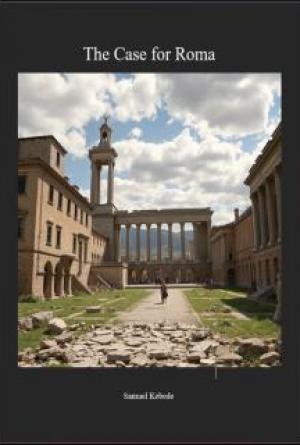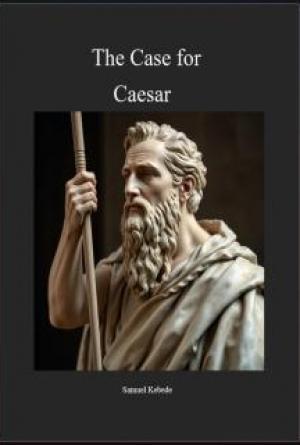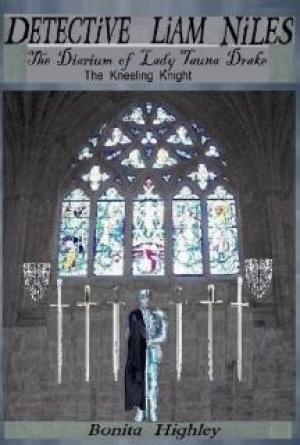CHAPTER XX
THE MYSTERY CLEARS
My story, in a way, really ends at this point, for we had no further adventures between the big wide waters and home.
Tired as we were, we experienced a lively thrill at sight of the grain elevator and the other towering landmarks in our home town. A number of people came running to the canal dock when they heard our organ, which we had switched on to triumphantly announce the arrival of the conquering heroes, so to speak.
After all of the very brave things that I had done, it wouldn’t have been displeasing to me if the town band had turned out to welcome me, sort of. I had already made up my mind that I wouldn’t try to keep my name out of the Tutter newspaper.
Dad was one of the first ones to arrive at the dock when we drew up. As can be imagined he got his eyes on my bandaged foot right away. And when I had told him what had happened to me, he rushed me up town to Doc Leland’s office, where an X-ray picture was taken of the injured part, to learn if any bones had been broken. An hour later, when Mother was washing hard on my ears, old Doc telephoned to the house that the bones were all right; my foot would be as good as ever, he predicted, in a few days.
Well, I wish you could have seen the amazement pictured in my parents’ faces when I dragged my roll of money out of my pocket and told them the complete story of our exciting adventure.
“A ‘friendly ghost,’ ” Dad laughed, in the conclusion of my recital. “You didn’t think it was a real ghost, did you?”
“Well,” I admitted, sort of sheepish, “I did at the start.”
“There is no such thing as a ghost.”
“I know that,” I waggled. “But just the same, if I were to meet a white thing in a dark cemetery, and it jumped at me, I’d run it an awful foot race.”
“The fear of ghosts, even as no such thing exists, is born in people,” Mother spoke up, finishing one ear and starting in on the other one. “So I can imagine just how Jerry felt.… Quit jerking your head!”
“Mr. Garber has an awfully queer voice,” I went on, blinking to keep the soapy wash rag out of my eyes. “He sort of talks out of his shoes. So it isn’t to be wondered at that we mistook him for a whispering ghost. Even when I knew he wasn’t a ghost, I sort of shivered to hear him talk.”
There was a thoughtful look on Dad’s face.
“I’ve often seen your old gentleman rowing up and down the canal. I wondered who he was.”
“He isn’t quite right,” I said, tapping the side of my head.
Mother drew a sharp breath.
“I should think not!” she put in quickly, screwing the wash rag into my ear. “The idea of sending a twelve-year-old girl on an errand such as that! The poor child! The wonder to me is that she wasn’t frightened out of her senses.”
I grinned.
“Mr. Garber wants me to come over and see him when my foot gets well.”
“I’ll feel safer if you keep away from him.”
“He’s a nice old gentleman,” I defended, “even if he is kind of queer, with a graveyard voice. Besides,” and here I winked at Dad under the flipping end of the wash rag, “the invitation comes from Lizzie, too.”
“Nonsense!” Mother sputtered, picking at a spot on the back of my neck with her finger nail.
“Tell me again,” Dad said, “about the ‘friendly ghost.’ I didn’t quite catch on from your story how the old gentleman worked it.”
I complied, explaining how Mr. Garber had been in Tutter on business the afternoon when we had chased the Strickers away from our boat. Starting for home in the evening, in his rowboat, he had been driven under the bridge by the storm. The rowboat had contained a white oilcloth, used in rainy weather, to keep the boat dry, and he had wrapped this about his shoulders like a shawl. Coming to our scow he had heard the Strickers on board telling how they were going to smash up our stuff. Having seen us hard at work that afternoon, and realizing how we would feel in the loss of our stuff, he had boarded the scow from the canal to drive the others away. With his dripping white hair and white shawl he had looked not unlike a ghost, and at sight of him the Strickers had run away in fright. The following day, on another rowboat trip to Tutter, he had overheard us talking about him, calling him the “friendly ghost,” so, when given another chance to help us, having detected the Strickers’ rope, he had signed the note in fun with the name that we had given him.
Dad laughed at the conclusion of my long explanation.
“Some adventure, I’ll tell the world!”
Well, to wind up my story, I will further explain that the girl’s grandfather and uncle were twin brothers, so much alike in appearance that the gardener never had suspected that the injured man that he had found in a pool of blood on the kitchen floor was his employer’s brother, struck down by his evil companion, and not the retired banker, himself. Nor had the police suspected the truth of the matter. As for us, never having seen the grandfather to know him, it wasn’t surprising, in the moment of his appearance in charge of the scow, that we had mistaken him for the other man.
But the girl knew that the tillerman was her grandfather and not her uncle. And you should have seen the way she flew into the old gentleman’s arms when we boarded the big boat.
The story that the unnerved grandparent gave us in his emotional reunion with the younger relative was rather vague and sketchy. And to this day I don’t know whether, in his wild flight from the log house, he knew that his brother had been struck down or not. However, that is not an important point.
Coming to the big wide waters shortly after we had rowed to shore with the brass box, he had seen our swinging lantern climb to the island’s summit. Frightened to a point of collapse in his advanced age by the night’s preceding events, he was now further unnerved by our presence on the island. The crazy idea came to him that we had dug up the bonds that the granddaughter (so he thought) had earlier buried. And to be near the bonds, with a view of secretly recovering them, he had hid on our boat, under the rear deck, and was there in the time of our trip into Steam Corners and back to the lock.
It was his drifting rowboat that Scoop and I had seen that morning when we went to the Sally Ann to get the stuff for breakfast. Further, it was the old gentleman’s footfalls that we had heard in our approach of the scow. And now that it is known that he was hidden under the deck where our food was kept, the mystery of the vanished ham is explained.
Lizzie had told us that her rascally uncle, on another visit to his wealthy brother’s home, had stolen a lot of the latter’s money. In fear of being caught with the money the thief had hidden it in a hollow leg of his brother’s old-fashioned piano, intending to return for the greenbacks later on. And we know that he did return for the money, after an elapse of nearly three years, bringing with him a man as evil-minded as himself. Whether or not the piano tuner knew of the money’s exact hiding place before coming to the log house never will be known to us. For the uncle kept a still tongue in his scheming head in the time that he was in the hospital; and as soon as he was discharged he quickly disappeared. But I have always held to the thought that the piano tuner found out about the money’s hiding place that night in the kitchen. That may have been the cause of his attack on the other—his decision, I mean, to recover the money himself. However, we got to the piano ahead of either of the two law breakers, as I have related. And the money was properly turned over to its rightful owner.
In refurnishing his summer home, shortly after the theft and the subsequent secretion of the greenbacks, the banker had sold his old-fashioned piano to his gardener; and later the gardener had been appointed to the position of tender at the Steam Corners lock.
Well acquainted with the lock tender, the banker, in a return of his main senses, had settled for the destroyed sheets, thereby gaining the release of our show boat, in which he had started for the island. How we had met him in the channel I already have described.
He had secured the “release” of my pants, too, as well as the show boat. And when I ran my hands into the pockets, there was our show money and my own eight dollars. Not a penny missing.
In Ashton we had a long talk with the mayor about the greased-pig trick. And when he learned that the policeman had been playing poker, when he should have been in the street on duty, it was mister blue jacket who got into trouble, let me tell you, and not us.
We hesitated to accept the two-hundred-dollar reward; for we didn’t want the girl to think that we had helped her in the thought of getting pay for our work. But the mayor said firmly that we had to take the money—the reward had been publicly posted, he explained, and consequently had to be paid. So we took it.
Back in Tutter again, we gave a sort of jubilee performance on the first night of our return, only I wasn’t of much help with my lame foot. We took in nine dollars and sixty cents. Everybody admitted that we had been very brave and Mr. Stair coaxed me to let him put my name in his newspaper. One of the big Chicago newspapers told about me, too, in eight or ten lines. It was very pleasing to me to read about myself. The other fellows were mentioned in the article.
Following the jubilee performance I made out a report of our show business, which showed how much money had been taken in and how much had been paid out. Here is a copy of the report:
|
Working capital advanced
|
$30
|
.00
|
Engine
|
$3
|
.00
|
|
Ticket sales
|
26
|
.60
|
Organ
|
2
|
.00
|
|
Reward
|
200
|
.00
|
Shaft
|
|
.50
|
|
Total money received
|
$256
|
.60
|
Tickets
|
1
|
.00
|
|
Expenses (subtract)
|
16
|
.50
|
Advertising
|
5
|
.00
|
|
Balance on hand
|
$240
|
.10
|
Food
|
1
|
.00
|
|
Each one’s share
|
$60
|
.02½
|
Handbills
|
3
|
.00
|
|
|
|
|
Oil
|
1
|
.00
|
|
|
|
|
Total expenses
|
$16
|
.50
|
You can see from these figures that our boat show was a big success. And we are not without hope that some day our parents will let us start out again.
Mother declares, though, that if we do revive our boat show that she is going to make it her business to go along with me with a wash rag and a cake of toilet soap.
She never will get over telling the neighbors, I guess, what dirty ears I came home with.
THE END







